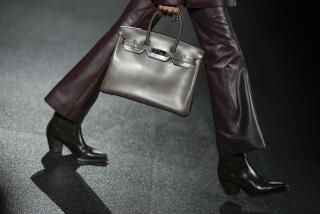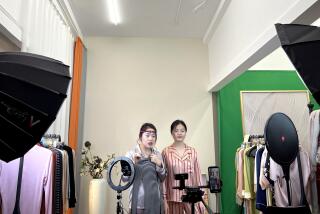Dior is seeking multimillion-dollar settlement from network of Chinese websites selling fake goods
- Share via
Christian Dior is going after a possible network of Chinese counterfeiters and wants millions in damages. The luxury fashion house filed suit in Illinois late last week against a host of web sites based in China that allegedly peddle an array of knock-off merchandise, from apparel to jewelry, using symbols and designs trademarked by Christian Dior Couture SA.
Certain of the trademarks at issue go back to the late Forties, around the time of the company’s founding, and Dior said in its complaint that its marks have “long been among the most famous and popular of their kind in the world” and been cultivated through great expense.
“The Christian Dior trademarks have achieved tremendous fame and recognition, which has only added to the distinctiveness of the marks,” the company said. “As such, the goodwill associated with the Christian Dior trademarks is of incalculable and inestimable value to Dior.”
Although a list of the specific web sites and their alleged operators is currently under seal, Dior alluded to the defendants being numerous and said they’re based in China. Dior earlier this year filed a similar suit in Florida and named more than 400 sites as allegedly selling counterfeit goods.
As for the Illinois suit, Dior said while based in China, the sites aim to sell their counterfeit goods in the U.S. through web sites and online marketplaces.
“Defendants facilitate sales by designing the defendant Internet stores so that they appear to unknowing consumers to be authorized online retailers, outlet stores or wholesalers,” Dior noted. “Many of the defendant Internet stores look sophisticated and accept payment in U.S. dollars via credit cards, Western Union and PayPal.”
A number of defendants’ domain names also include Christian Dior in one way or another and even offer customer service to “further perpetuate the illusion of legitimacy” for shoppers.
While Dior admitted that the sites’ operators “go to great lengths [to] conceal their identities,” including using multiple fake names and addresses for registration purposes and the regular creation of new web sites, it said many of the sites have “virtually identical layouts” and merchandise has similar irregularities.
This suggests to the company that “the counterfeit Dior products were manufactured by and come from a common source and that defendants are interrelated,” according to the complaint.
Dior has an internal anticounterfeiting program that has attempted to stop this purported Chinese network, but to no avail.
The company cited U.S. government data in claiming sites like those allegedly operated by defendants generate more than $100 billion in sales every year, creating lost jobs and tax revenue among other “economic damages.”
Beyond that, Dior said the continued sale of the counterfeit goods “is likely to cause and has caused confusion, mistake and deception by and among consumers and is irreparably harming Dior.”
With that, the company asked the court to permanently bar the defendant web sites from selling any goods using the Dior trademarks, and that all of the domain names be handed over to the company, along with the right to force any marketplace or search engine to halt any service or business with the defendant sites.
Dior is also seeking the disgorgement of all profits realized through the sale of the infringing goods, or the alternative, a $2 million damages award for “each and every use” of its trademarks and $100,000 for each domain name incorporating its marks.
Counsel for the company could not be reached for additional comment.
ALSO
Dior gets tangled up in blue at Paris Fashion Week
Dior mixes fashion and art for Lady Dior Art pop-up in Beverly Hills
Meet AnnaBís, a handbag line designed to help you port your pot in high style







